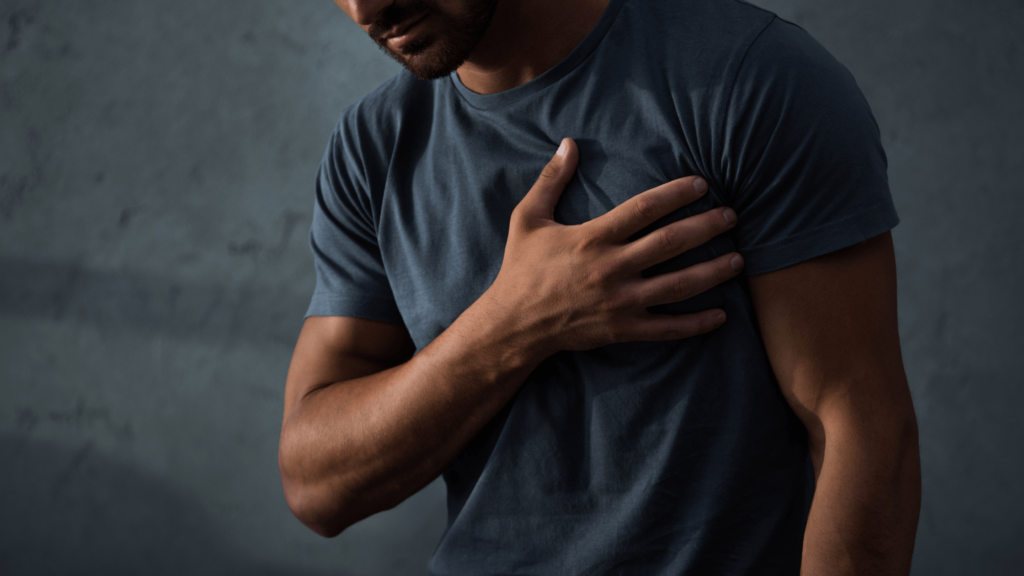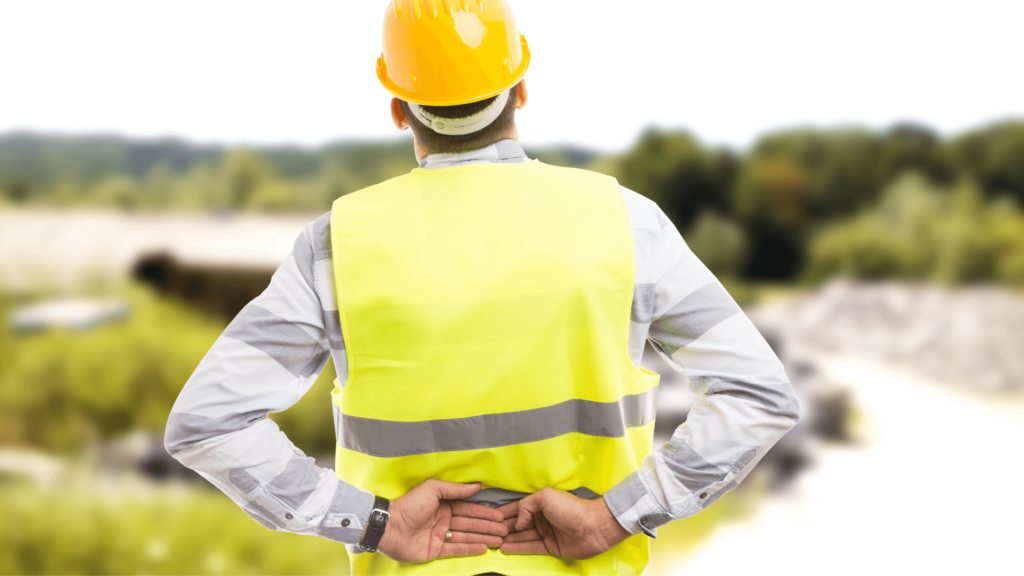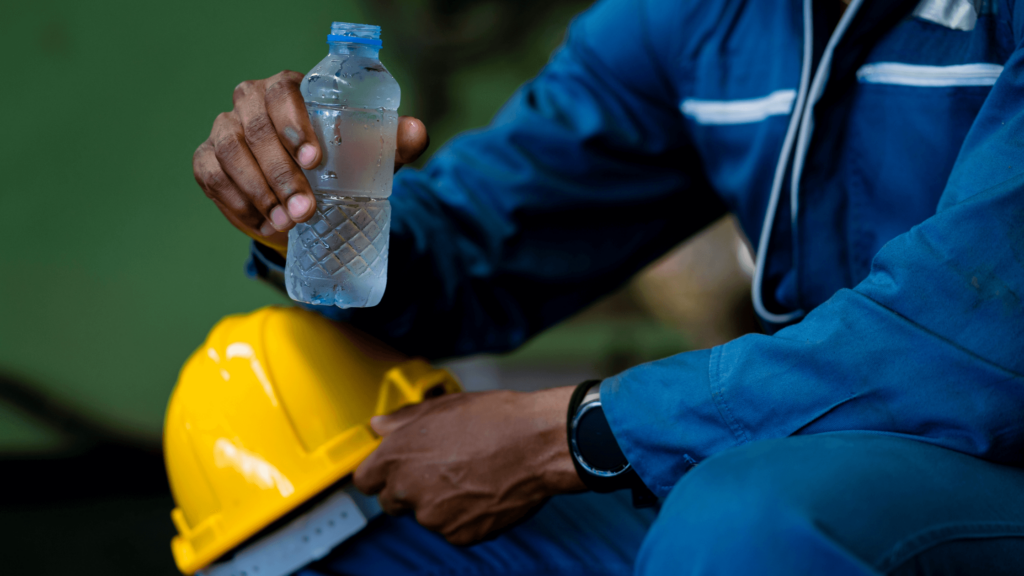Inadequate water intake reduces blood volume and increases blood pressure. Less oxygen being delivered to organs and tissues increases stress on the heart and the risk of chest pain. Frequent UTIs, back pain, and high blood pressure are also signs of dehydration. Staying on top of water intake is the easiest way to prevent dehydration and chest pain.
The human body is composed of more than 60% water, so it shouldn’t come as a surprise that we don’t feel great when we don’t drink enough water. Besides nagging thirst, insufficient water intake can lead to dizziness, lightheadedness, dry mouth, headaches, and even pain. And the chest pain you’re feeling now and again? That could also be because you’re dehydrated.
While chest pain isn’t a classic sign of mild dehydration, severe dehydration can alter your blood pressure, which could lead to a tight feeling in your chest.
Dehydration and chest pain: What’s the link?

Your body naturally loses water through sweat, urine, and bowel movements. Physical activity, especially in hot conditions, can also increase fluid loss.
When hydrated adequately, the heart—which pimps about 2,000 gallons of blood daily—works optimally and efficiently. When dehydrated, the heart compensates by pumping harder and faster. If severely dehydrated, water levels in the blood fall, and blood becomes thicker, making the heart work even harder.
There’s also research to suggest that chronic hypohydration can increase the risk of adverse cardiovascular events down the road. In the short term, however, it can:
- Increase inflammation
- Reduce endothelial function
- Affect measures of arterial stiffness
Changes in various circulating factors that come with acute hypohydration can also result in changes in vascular function and blood pressure regulation.
When blood pressure drops, the body tries to compensate by increasing your heart rate and constricting your blood vessels.
The extra strain on the heart due to inadequate water intake can lead to chest pain for some people, especially those with heart disease. It can also cause heart palpitations as your heart beats faster to deliver sufficient levels of blood and oxygen to your organs.
The more dehydrated you are, the more likely you feel these effects.
Note: In some cases, the cardiac effects of dehydration, such as increased heart rate or chest pain, could indicate an underlying cardiovascular condition.
If you’re having difficulty breathing, feel pain or tightness in your chest, or feel dizzy or lightheaded when you have palpitations, contact your healthcare professional immediately.
3 more side effects of dehydration
1. UTIs
While there’s little concrete evidence to support the link between dehydration and UTIs, it’s suggested that maintaining adequate hydration helps to reduce the incidence of UTIs by diluting and clearing bacteria.
Urinary tract infections (UTIs) are more common in women, but men can also get them. UTIs arise when there is an infection of any part of the urinary system, including the urethra, ureters, bladder, or kidneys. They are relatively common (and repeat offenders) but unpleasant.
Common symptoms of a lower UTI include:
- Burning when urinating
- Increased frequency of urination without passing much urine
- Increased urgency to urinate
- Blood in urine
- Cloudy urine
- Urine that looks like cola or tea
- Urine with a strong odor
- Pelvic pain (women)
- Rectal pain (men)
Symptoms of an upper UTI are slightly different and include:
- Tenderness and pain in the upper back and sides
- Fever
- Chills
- Nausea
- Vomiting
Pro tip: Stay on top of your water intake. You’re not drinking enough if your urine doesn’t look like lemonade.
2. Back pain

Back pain might seem like an odd side effect of being hydrated, but even your spine needs water. That’s because the gel-like substance (nucleus pulposus) that sits inside the intervertebral disc—which accounts for most of the spine’s strength and flexibility—is made up of about 66% to 86% water, with the remainder consisting primarily of type II collagen and proteoglycans.
The purpose of the discs is to separate the bones of your spine and provide cushioning and mobility. When the nucleus pulposus loses water and can’t hold the weight of your body, it can bulge or herniate.
The result: Herniated or bulging discs themselves will cause back pain, but compression of the nerves within the spines.
3. High blood pressure
Maintaining healthy blood pressure is important for adequately delivering oxygen and nutrients to organs and tissues—sufficient water intake is a big part. Dehydration causes sodium levels to rise. Your body responds by releasing a hormone called vasopressin (antidiuretic hormone, ADH) that signals your kidneys to retain water.
The problem: Vasopressin also causes vasoconstriction, which increases blood pressure. For people with normal blood pressure, the acute spike isn’t a huge deal—for people with hypertension, it is. Chronically high blood pressure damages blood vessels, including the arteries that supply blood and oxygen to the heart. This increases the risk of cardiovascular problems like heart disease and stroke.
How to tell if you’re dehydrated
Your body will give you many signals to let you know you need to drink more water. While thirst is the most common indication, also look out for the following symptoms when you’re dehydrated:
- Fatigue
- Dry skin and lips
- Dark urine
- Decreased urine output
- Headaches
- Muscle cramps
- Lightheadedness
- Dizziness
- Fainting
- Orthostatic hypotension (low blood pressure after sitting/standing)
- Heart palpitations
As dehydration becomes more severe, more serious symptoms can occur. These include:
- Mental confusion
- Lack of urination
- Rapid heart rate
- Rapid breathing
- Shock
If you notice these symptoms, contact your doctor and visit the nearest ER immediately.
How to prevent dehydration

The answer is simple: Drink water! But that’s sometimes easier said than done.
Your exact fluid intake requirements will vary based on age, size, physical activity level, and climate, but aim to consume a minimum of 2 liters of water (or other hydrating fluid) daily. Your requirements will be higher if you’re more physically active or work in a hot climate.
Tip: Aim for urine that’s the color of lemonade—that indicates you’re well hydrated.
Even if you’re only slightly thirsty, ensure you drink throughout the day. Drinking plain water can typically correct mild dehydration, but adding electrolytes can help rebalance mineral levels faster. Also, aim to consume foods with high water content throughout the day, especially when the weather is warm.




3 comments